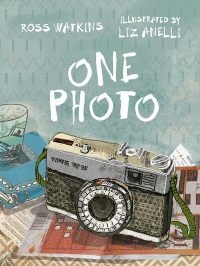One Photo
Ross Watkins
Liz Anelli
Penguin, 2016
32pp., hbk., RRP $A24.99
9780670077977
One day dad came home with an old camera – the type that used film and you took it to get developed and you had real photos in your hand to keep. Then he spends his time taking photos of things around the house. Not the usual things that people photograph but odd everyday things like his cereal bowl and coffee cup. Things that he didn’t want to forget as though he thought he was in danger that he would.
He got the photos developed and stuck them on the window in his study. He used more and more rolls and took more and more photos, but he didn’t seem to want to take any of his family. This upset them terribly. “Aren’t we worth remembering?” they asked.
And then the camera was gone. And so was Dad. For ever. But one day the camera turns up in the post. There is still a film in it and when they get it developed, there is just one photo. And finally his family understands the purpose and significance of all those other photos.
This is a most poignant story, one of the most unusual I’ve read in a long time. And yet it is a story of many of our students, one that may be hard for them to articulate. In the gentle drawings and soft palette it traces a father’s way of dealing with a terminal illness, one which affects his mind and memory but in a way that is filled with love and tenderness. The endpapers are intriguing as they juxtapose two different types of photos – one set full of people shots, the other not. Those of us old enough to remember “real” photos will be taken back to the days of photo albums and the pleasure they give as they are dragged out so memories can be revisited and recalled, where only one or two photos were taken for posterity rather than the plethora taken today as though we live through the photo rather than the event, even though we might not look at the photo again. Photos were private memories not public trophies And we will understand what Dad was trying to do and why the old-fashioned camera was so important. It could open up a whole new world for students who may be scrambling to find such memories in a few years as technology moves inexorably onwards.
One Photo is different. It’s sad and moving and yet offers hope for those who might be left behind – memories don’t have to fade.

